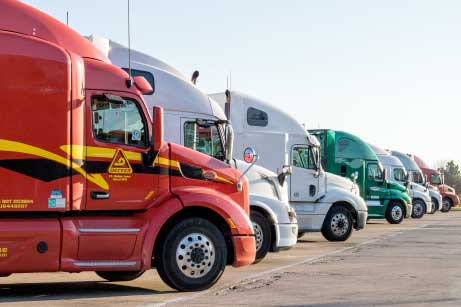From small trucking companies to multinational conglomerates, shipping businesses of any size can become more sustainable with some changes.

It’s no secret that the trucking industry has room for improvement concerning sustainability. Transportation accounts for 28% of emissions in the U.S., and trucks make up 23% of that. The global automotive industry is moving toward eco-friendliness, though, so there’s still hope.
Major trucking companies and small shippers alike are taking steps to reduce their emissions. There may still be a ways to go, but the industry has made tremendous strides in lowering its environmental impact. If these trends continue, a future of zero-emissions trucking is looking more and more viable.
The introduction of telematics is one of the most significant advances trucking companies have made in sustainability. By installing all manner of monitoring devices, the transport and logistics industry can take more control over their emissions. The data from these devices shows truckers where and how they can improve.
Internet of Things (IoT) sensors can record data like engine performance and driving habits. That way, companies can see if drivers are making poor environmental choices, like letting the engine idle for too long. They can then take steps to discourage these behaviors and help drivers improve.
Even something as small as maintaining proper tire pressure can lead to a 3.3% increase in fuel efficiency. Telematics systems can track all of these minute details and report when drivers should address them.
Another trend emerging in the transport and logistics industry is a greater emphasis on route planning. Not planning routes for each shipment can lead to higher fuel consumption in several ways. Optimized planning includes more than just looking for the shortest path, too.
Things like traffic and weather can slow trucks down, which hurts fuel economy. If a driver is stuck in a traffic jam or has to drive in a lower gear because of rain, they’ll use more fuel. Using artificial intelligence (AI) systems to predict weather and traffic can help trucking companies avoid these situations.
The most efficient route won’t be the same every time. By paying attention to these details before each shipment, truckers can ensure they take the best path each time.
Some steps in becoming more sustainable involve changing the trucks themselves, not just their operations. One of the most effective ways companies can improve their trucks is by paying attention to aerodynamics. The more aerodynamic a vehicle is, the less drag it will encounter, so the more efficient it will be.
Traditionally, heavy-duty trucks are not particularly aerodynamic, seeing a 53% aerodynamic loss from just four design areas. In the past few years, though, freight trucking companies have taken steps to change that. Redesigned tractors, smaller gaps between the truck and trailer and new bumper shapes have all improved aerodynamics.
Better aerodynamics comes with the added benefit of making trucks faster. Trucking companies can reduce their carbon footprints, and they’ll also see improved delivery times.
Many of these advances help companies reduce the impact of their diesel- or gasoline-powered trucks. Some businesses are trying to move away from fossil fuel vehicles altogether, though. As these technologies become more reliable and affordable, more companies are adopting them.
Biodiesel is the most popular alternative fuel in the transport and logistics industry right now. In the past few years, there’s been a significant shift toward electric vehicles, though. From batteries to hydrogen fuel cells, electric vehicle technology is more accessible to these companies than ever.
UPS already operates roughly 100 electric trucks and plans to implement hundreds more. If even a fraction of the industry switches to electric vehicles, it would substantially lower the sector’s carbon emissions. If everyone made the switch, it would virtually eliminate emissions.
There’s no single option for pursuing sustainability in a trucking company. The global automotive industry has developed several different ways to reduce emissions, and more possibilities emerge all the time. When it comes to sustainability initiatives, trucking companies are spoiled for choice.
From small trucking companies to multinational conglomerates, shipping businesses of any size can go green. With further research and development, these options will only increase. The trucking industry is greener than ever and may even reach net-zero emissions before too long.
 Martin Banks if the founder and Editor-in-Chief of Modded. He covers business, industry, and tech for sites all over the internet, such as Manufacturing Tomorrow, Industry Tap, and more. Say hello to him at Martin@Modded.com.
Martin Banks if the founder and Editor-in-Chief of Modded. He covers business, industry, and tech for sites all over the internet, such as Manufacturing Tomorrow, Industry Tap, and more. Say hello to him at Martin@Modded.com.
Scott Ellyson, CEO of East West Manufacturing, brings decades of global manufacturing and supply chain leadership to the conversation. In this episode, he shares practical insights on scaling operations, navigating complexity, and building resilient manufacturing networks in an increasingly connected world.